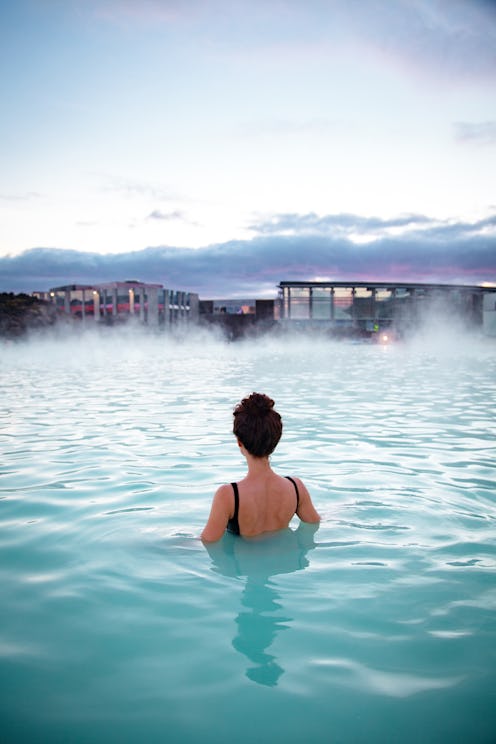(Health)
Here’s Why You Should Take A Thermal Bath — STAT
Soak it all in.

You may think getting into a thermal bath, like a hot spring — a pool of water with mineral elements — is simply a nice, relaxing thing to do, whether it’s close to home or a plane ride away (think the Blue Lagoon in Iceland). But there are many health benefits of thermal baths, too.
Dr. Sony Sherpa, holistic doctor and author at Nature’s Rise, says that when it comes to thermal baths, you should always consider two things if you want it to be truly therapeutic — the chemicals in the water and the temperature. “Thermal water comes from natural springs, and contains minerals like calcium, selenium, sulfur, magnesium, and iodine,” she tells TZR in an email. “These chemicals help reduce inflammation in the body and fight off infection by helping balance the skin’s natural good and bad bacteria.”
Although temperatures of thermal baths vary depending on which one you go to, heat is the name of the game. For instance, the thermal baths at the Széchenyi Medicinal Bath in Budapest (which is also the largest medicinal bath in Europe) range from 28 to 40 degrees Celsius (82 to 104 degrees Fahrenheit). Meanwhile, the temps at Iceland’s Blue Lagoon range from 37 to 40 degrees Celsius (98 to 104 Fahrenheit).
Chinthaka Dilanjan of Healing Holidays, a company that specializes in spa and wellness trips, adds that thermal baths are not a new concept. “They have been used from as early as the Medieval era to treat various illnesses and injuries,” he tells TZR in an email.
As for who should take a soak in a thermal bath, Dilanjan says anyone can — but it’s best to talk to your healthcare provider first, as the hot water may not have a positive impact on everybody. (It can elevate your heart rate, for example.) But, assuming you get the go-ahead to soak in a thermal bath, there are many reasons for doing so, Dilanjan notes, from wanting to relax and de-stress to lessening joint or bone pain.
“Thermal baths are relaxing and beneficial for almost everyone,” Dr. Jenelle Kim, doctor of Chinese Medicine and founder and lead formulator of JBK Wellness Labs, tells TZR. “Natural thermal baths can be found around the world, yet indoor thermal baths are a great option if you live somewhere far from naturally occurring ones. It is important to note that soaking in plain water (or salt water) is different than mineral water (balneotherapy), so if you seek an indoor option, make sure the water includes minerals.”
Kim says she prefers natural thermal spas because of the additional mental and spiritual benefits of being in the fresh air and spending time in nature. (She likes the thermal spa at Two Bunch Palms, a wellness retreat located in Desert Hot Springs, California.) Sherpa seconds the fact that it’s best to find natural thermal springs since they produce geothermally heated groundwater that offers numerous benefits. “Generally, anyone can have a thermal bath for relaxation and beauty purposes, but it is particularly helpful for people who want to experience its therapeutic effects,” she says.
Ahead, thermal bath experts get further into specific benefits of the hot, healing waters.
Improving Skin Conditions, Like Eczema
“Mineral water thermal baths are known to be an effective treatment for treating skin conditions and sunburns,” says Dilanjan. To his point, research shows that thermal spring waters lower inflammation and can help chronic inflammatory skin conditions like atopic dermatitis, psoriasis, rosacea, and eczema. “Plus, the heat from the water dilates the blood vessels — this alone can improve the glow and texture of the skin,” Dilanjan adds.
Sherpa agrees. “Thermal baths have antioxidant effects that help protect the surface of your skin against damage caused by free radicals,” she explains. “Spring baths, in general, make the skin softer, more moisturized, and healthier, so it is popular as a part of beauty and wellness regimen.” Kim agrees that thermal baths are nourishing for the skin. “The minerals not only provide antioxidants, but also anti-microbial benefits,” she says.
Boosts The Immune System
“Thermal water positively affects your immune system and the release of hormones in your body,” says Sherpa. For example, the therapeutic water can help alleviate various illnesses, such as respiratory diseases (including allergic rhinitis, asthma, and chronic obstructive pulmonary disease).
“When you soak in thermal water, you relieve the symptoms of inflammation and alleviate pain,” Sherpa adds. “Ultimately, the experience boosts your sense of wellness.” Speaking of reducing pain…
Reducing Joint Pain & Inflammation
Thermal baths also help alleviate joint pain that’s common with conditions like arthritis and osteoporosis, Dilanjan explains. This is because the heat helps relax stiff joints — it increases blood flow, which boosts circulation. In one study, for instance, bathing in thermal waters (particularly the sulfurous variety) reduced pain and improved physical function in people with knee osteoarthritis.
Helps Your Mental Health
Thermal water can be a good solve for mental health issues, too. Research has found that it can decrease symptoms of anxiety and depression, which then causes people to sleep better, too. Other studies have also revealed that soaking in thermal water helped reduce stress-related symptoms, including general, physical, and mental fatigue, while increasing mood, motivation, and cognitive functioning.
“Another big advantage of thermal baths is taking a digital detox,” says Dilanjan. Doing so can reduce stress, increase focus, and boost your mood. Plus, digitally detoxing will have you focus on the present instead of endlessly scrolling through social media posts, texts, or emails — which can contribute to stress and unease.
“In general, thermal baths improve your overall well-being,” says Kim. And who wouldn’t want that, right?